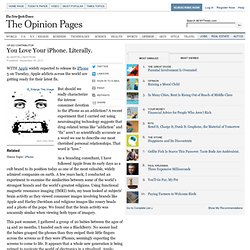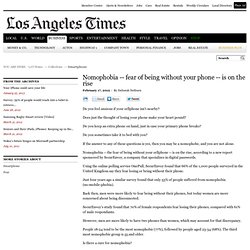

You Love Your iPhone. Literally. But should we really characterize the intense consumer devotion to the iPhone as an addiction?

A recent experiment that I carried out using neuroimaging technology suggests that drug-related terms like “addiction” and “fix” aren’t as scientifically accurate as a word we use to describe our most cherished personal relationships. That word is “love.” As a branding consultant, I have followed Apple from its early days as a cult brand to its position today as one of the most valuable, widely admired companies on earth. A few years back, I conducted an experiment to examine the similarities between some of the world’s strongest brands and the world’s greatest religions. Using functional magnetic resonance imaging (fMRI) tests, my team looked at subjects’ brain activity as they viewed consumer images involving brands like Apple and Harley-Davidson and religious images like rosary beads and a photo of the pope.
So are our smartphones addictive, medically speaking? My best advice? Fear of being without your phone. Do you feel anxious if your cellphone isn't nearby?

Does just the thought of losing your phone make your heart pound? Do you keep an extra phone on hand, just in case your primary phone breaks? Do you sometimes take it to bed with you? If the answer to any of these questions is yes, then you may be a nomophobe, and you are not alone. Nomophobia -- the fear of being without your cellphone -- is on the rise, according to a new report sponsored by SecurEnvoy, a company that specializes in digital passwords. Using the online polling service OnePull, SecurEnvoy found that 66% of the 1,000 people surveyed in the United Kingdom say they fear losing or being without their phone. Just four years ago a similar survey found that only 53% of people suffered from nomophobia (no-mobile-phobia). Back then, men were more likely to fear being without their phones, but today women are more concerned about being disconnected.
People 18-24 tend to be the most nomophobic (77%), followed by people aged 25-34 (68%). Mobile Users Expand Their Search Habits. More than 91 million US consumers will use the internet through a mobile device at least monthly by the end of this year, eMarketer estimates, and research shows that the increase in on-the-go web usage goes hand in hand with more search activity for local content.

According to research from comScore and the Local Search Association, 22% of all US mobile owners used search on their phone in January 2011, up from 16% a year earlier. In addition to the rise in reach, there has also been a rise in frequency. By January 2011, there was a 10% year-over-year drop in the share of users searching just a few times per month. At the same time, almost-daily usage was up 20%. More than half of mobile search users now search on their device at least weekly. Mobile users are also upping their use of local content, by 34% year over year. The need for local businesses to reach mobile users when they are nearby is clear and growing. Keep your business ahead of the digital curve.